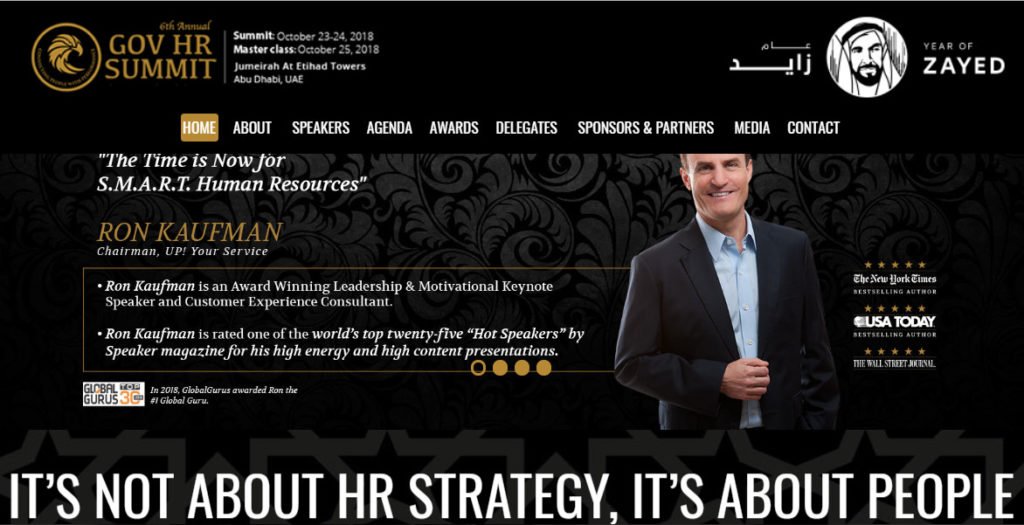
On 23-25 October 2018, I am delivering a keynote speech and Leadership Master Class at the GOV HR Summit in Abu Dhabi. The event organizers interviewed me with excellent questions about Leadership, Culture, and the Future.
According to you, What are the three important traits of successful leaders and Why?
1. Successful leaders recognize that culturally strong organizations are essential for success in the world today. You must attract great employees/team members, and great customers. And you must KEEP both!
Having terrific products, excellent policies, competitive pricing, speedy and convenient delivery are all becoming commodities (readily available from companies and in cities around the world).
What enables one organization (private industry or government) to stay in the game and win in the game is having a culture that acts like a magnet. Not just “attracting” good people, but “keeping them” loyal and committed over a long period of time.
2. Successful leaders have, use, and follow a proven methodology to create and sustain a successful culture over time.
Culture is not created in a factory or in a meeting. It must be cultivated, nurtured, and carefully supported to grow strong and stay strong.
While this is a highly emotional phenomenon (affecting how people feel about the organization), creating a strong and sustainable culture is not only an emotional undertaking. It must be planned, continuously assessed, refined, and improved. In fact, culture can and should be engineered, and not left to hope or chance.
This requires a solid framework, proven methodology, and well-designed plan to make it happen and keep it strong.
The Uplifting Service methodology is called the “Uplifting Service Architecture”, with three elements: a foundation of “Continuous Service Improvement”, a protective roof of “Service Leadership Behaviors” and a central core with “12 Building Blocks” of key activities that enable, encourage, and inspire the right cultural behaviors.
3. Successful leaders know their own personal behavior sends a vital signal to everyone – positively increasing credibility and commitment, or negatively weakening and even undermining the best of culture-building efforts.
- Declare service a top priority
- Be a great role model (walk the talk)
- Promote a common service language
- Measure what really matters
- Enable and empower your team
- Remove the roadblocks to service
- Sustain focus and enthusiasm
A live keynote video segment about The 7 Rules is right here, and may be shared with others.
What advice would you give to the emerging leaders of today dealing with complex cultural, political, strategic, and other organizational challenges within organizations and social systems?
The world is changing more quickly than at any earlier time in history, and this will continue in the decades ahead. The essential skills needed for this “new world” we share are resilience, flexibility, creative collaboration with others, and the willingness to be proactive, take the initiative to open conversations, propose new approaches, and be willing to try new ideas.
Building a culture that encourages this resilience, new learning, honest flexibility, and the ability to focus and refocus over and over and over again is key to organizational success, and to personal well-being.
Emerging leaders MUST pioneer and promote the development of cultures that provide their team members (leaders, managers, supervisors, and front line) with this kind of morale building and encouragement providing environment in which to work, learn, and grow together.
What according to you is the key for leadership development as well as youth empowerment in public organizations?
Put young people in positions of influence early. Support them so when they make mistakes (which they will) their mistakes become opportunities to learn, not incidents to be tracked or scolded.
A good way to think about this is the mentor-mentee relationship. We hear this phrase and usually think the “older” person should (or must!) be the mentor. But with the world moving as quickly as it is, and online/digital/social behavior evolving constantly, perhaps those who are “older” and in senior positions should be appointing the new and young ones as OUR mentors…to help US understand, adjust, and evolve to embrace new realities. Makes sense? Sure. But are you doing it? Hmmm….
Implement this throughout your organization and watch your young leaders emerge, your older workers adjust, and the culture of your organization GROW into the future…and help CREATE the future.
Why would you recommend HR professionals to attend the GOV HR Summit and what are the key takeaways they can expect from your session?
The GOV HR Summit is one of the best events of the year for HR professionals to LEARN, SHARE, and NETWORK with others in the field. No one has all the answers, but ALL of us must be curious and open to explore the questions.
Let’s meet in Abu Dhabi and dive into these questions TOGETHER. I look forward to seeing you there!



